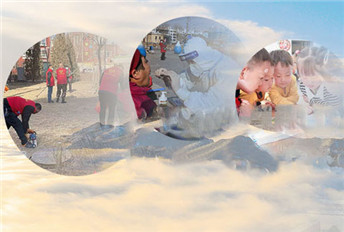More new mothers seeking professional assistance for postpartum rehabilitation
When she gave birth to her first child 11 years ago, Bai Juan threw herself entirely into taking care of her baby girl. But when she became a mother to her second child, she decided to spare some time for herself.
Bai, 39, is a teacher at a vocational school in Yinchuan, Ningxia Hui autonomous region.
After delivering her second daughter this year, she hired a nanny to take care of her and the baby. In addition, she visited the Yinchuan Women and Children Healthcare Hospital twice a week for postpartum rehabilitation, including pelvic floor therapy.
"Your body doesn't lie. It feels really good after the rehabilitation," she said.
China relaxed its family planning policy in 2016, allowing each family to have two children. With the increasing awareness of their health and body shapes, more and more new mothers, many of whom are older and find it harder to recover, are turning to professional institutions for postpartum recovery.
The Yinchuan Women and Children Healthcare Hospital is the largest such healthcare institution in Ningxia. Last year, it treated nearly half of the 7,000 new mothers in the hospital, offering pelvic floor therapy and other rehabilitation.
Wang Jie, who has worked in the hospital for 18 years, has witnessed people's changing attitudes toward postpartum recovery.
According to the head nurse of the maternity department, when the hospital initiated postpartum recovery therapies in 2008, they had only 200 mothers a year opt for the rehabilitation.
"Most new mothers back then spent almost all their time nursing their children, neglecting their own health," Wang recalled.
Wang attributed the rising public awareness to the efforts of hospitals through lectures and postpartum visits, as well as the information shared via popular nursery accounts online and books offline.
Zhang Yanqin, a senior doctor with the Yinchuan Women and Children Healthcare Hospital, said pregnancy and delivery are major factors behind women's pelvic floor dysfunction-disorders that occur when pelvic floor muscles and ligaments are impaired.
"The pressure generated by the fetus during the process of pregnancy and delivery damages the resilience of pelvic floor muscles, leading to symptoms like urinary incontinence while sneezing or coughing," Zhang said, adding that such symptoms may deteriorate when women grow older.
According to a survey published in 2006 by Peking Union Medical College Hospital, among 5,221 female respondents aged 22 to 99 in Beijing, 38.5 percent were found to have urinary incontinence.
The rising awareness of postpartum health has also greatly spurred the postpartum care market in China.
The number of maternal care centers providing postpartum recovery and maternal and child health services skyrocketed from 550 in 2013 to 4,400 in 2019 across the country. The number is expected to further expand to 4,800 this year, according to the report jointly released by Meiyou, an online platform engaged in women services, and intelligent information platform MobTech.
"A wise mother should treat herself better. I'm delighted to find that more friends around me are taking better care of themselves while taking care of their babies," Bai said.

 Yinchuan Wine-producing Area at the eastern foothills of Helan Mountains
Yinchuan Wine-producing Area at the eastern foothills of Helan Mountains A promising Sci & Tech center in NW China
A promising Sci & Tech center in NW China Party building stories in Yinchuan's Xixia district
Party building stories in Yinchuan's Xixia district